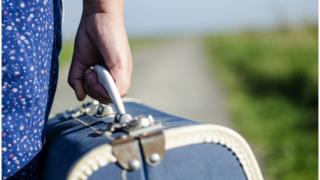Empty nest syndrome: The unexpected grief
Parents whose children have left home question why no-one told them it would hurt so much. …

 Image copyright Getty Images
Image copyright Getty Images It was the butter mountain and the milk lake that hit her when she opened the fridge.
There was no-one there to use them up; they were a reminder of all she had lost.
When a son who devours his bodyweight in cereal leaves home, you start to measure out your life in milk cartons.
You need to stop catering for a hungry teenager. Life will never be quite the same.
Like thousands of other parents, this Belfast mother waved her son off to university in Scotland.
She wishes to remain anonymous to protect his identity or, perhaps, her admission that she found his leaving so difficult.
His father took him on the ferry, she stayed at home, channelling the cleaning guru Mrs Hinch.
Rubber gloves on, she moved in for the kill.
“I thought it would be a great chance to get into his bedroom and give it a really good clean,” she said.
“I took away the old socks and T-shirts, I turned the room upside down.
“Then I stood back and I thought that once the smell of dirty sock and the empty crisp bags were gone, it wasn’t his room any more.”
She was surprised at how the grief hit her.
Empty nest syndrome – a combination of loneliness and grief when your children leave home – strikes thousands of parents each year.
TV chef Gordon Ramsay – not averse to giving people as well as vegetables a good roasting – turned marshmallow soft when he talked about his son, Jack, leaving home for university.
In an interview, he said he was surprised that he felt so “gutted”.
He confessed that after his son had gone, he went into Jack’s room, found a pair of his pants and put them on.
Claire Sheeran knows all about empty nest syndrome.
“I was a single mother from virtually before she was born and she was my one and only,” she said.
“After 19 years, I was not prepared for how her leaving would affect me.”
The mother, from County Antrim, said it hit her on the way back to the ferry after leaving her daughter at Liverpool University.
“I was okay until I hit the M2 motorway and then I bawled my eyes out,” she said.
‘Just me and the dog’
The sheer force of grief proved unexpected.
“I didn’t know what my role was any more,” she said. “There was just me and the dog at home.
“The house felt empty and I brought the dog to sleep in my bed – that’s the way it has been ever since.”
She knew she needed to reach out to friends and find her own interests.
And she sought solace in the often-quoted words of poet Kahlil Gibran: “Your children are not your children. They are the sons and daughters of Life’s longing for itself.”
Celia Dodd has so much experience of empty nest syndrome, she wrote a book about it.
“When my son, the first one left, I was really devastated, You feel like you have lost a part of you,” she said.
“It was hard with each one. It did not get easier.”
The journalist and mother-of-three said people do not talk about that emptiness and fathers often do not talk about how they are equally affected.
“I spoke to one man on the day his daughter was leaving for university,” she said.
“He said: ‘What I feel is that she will never be with us in the same way again’.”
The author said she missed the casual chats with her children.
In the early days of empty nest, she took in Chinese students who had nowhere to go in the holidays.
She grew tomatoes and volunteered in a homeless shelter.
“It tided me over,” she said. “I had all of this nurturing with nowhere to go.”
Her advice is to acknowledge that parent-child relationships change, then shift the focus on to what you want.
She writes about how to navigate that change and how adult children still need their parents – but in a different way.
Tony Cassidy, professor of child and family health psychology at Ulster University said that while Empty Nest Syndrome was not a clinical diagnosis, it is widely recognised that when children leave home parents – particularly mothers – experience a sense of sadness, loss, depression, loneliness, distress, and even a loss of purpose and meaning in life.
Prof Cassidy said mothers tended to be more likely to experience these emotions.
“The problem is that it often coincides with other life changes such as onset of menopause, breakdown of marriage, loss of own parents.
“Many women sacrifice their own careers for family and, at this time, there is a sudden realisation of emptiness in life – lack of life purpose.”
He said “empty nest” tended to happen later for many people as women are having children later in life and children are living at home for longer.
“The average age of children leaving home these days is 26,” he said.
“The problem with diagnosis and treatment is that it may be confused with menopause onset and not recognised as an issue in need of help or support in its own right.”
It’s clear empty nest syndrome affects many parents in a variety of ways.
And it seems family pets can also be affected.
“The dog was pining for him,” said the Belfast mother. “He searched all over the house, crying for him.
“He stood at the door waiting for the return of the beloved and when he did come home, the dog ran about madly in circles.”
No doubt she was (privately) doing the same.




